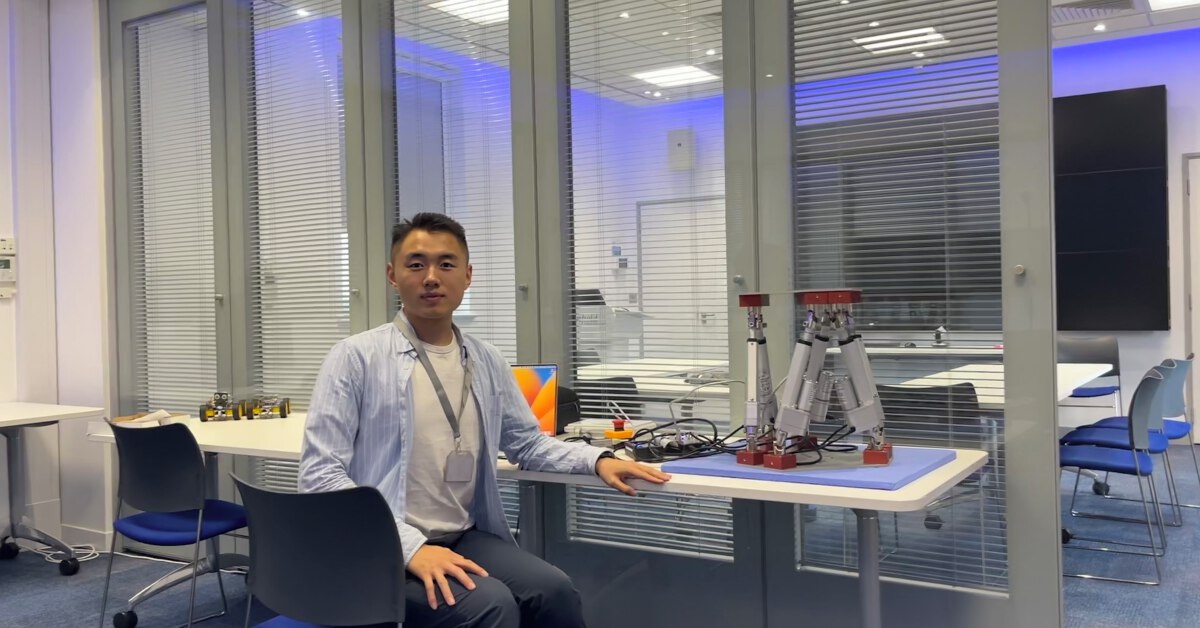Zhen Sun: Why I chose Cranfield
26/09/2023

After completing an undergraduate degree in Internet of Things Engineering, Zhen Sun was working with Siemens and looking for an area to give his focus to. He seized the opportunity to upgrade his skillset at Cranfield, choosing to embark on a Master’s course, Cybersecurity in Manufacturing and is now pursuing a PhD, researching resilience with digital twins.
“I especially liked the group project setting, where I could better interact with people from different backgrounds and cultures. It was my favourite part of the programme in the first place.”
Zhen discovered the research area of digital twins during discussions with a group project supervisor and chose a related topic for his individual project. His decision to stay at Cranfield to take on a PhD was founded in this moment – finding Cranfield research that fitted his interest, coupled with a multitude of industry links. A typical day involves going into the office and getting up to date on new articles for ideas. Then, lunch and time to collaborate and communicate with colleagues in the lab in the afternoon. The day ends with a quick workout and a game of badminton in the evening.
Zhen especially likes technology, believing that it changes lives. He has an artificial eye, arising from a badminton accident when a shuttlecock hitting his eye caused a traumatic cataract. Zhen still chooses to play badminton and is proud President of the Cranfield Badminton Association which boasts 210 members. Zhen likes the fact that Cranfield is a specialist postgraduate university, enjoying interactions with peers.
“They are on the same channel as you and there are no barriers for communication, yet at the same time you’re able to share interesting research with each other.”
What advice would Zhen share with anyone applying to study at Cranfield University?
“Find a direction of interest, read through a lot of literature, identify problems, and solve them. It’s really fun to do experiments like playing games while digitising. Think about the digital twin, although it seems costly now, it can help whole industries and the world become resilient. For example, environment, finance, engineering, and a series of other projects, come and discover what the digital twin can do for your industry.”
What does Zhen hope will come from his research into digital twins?
The biggest difference between digital twins and simulation is the ability to provide feedback. It combines a range of advanced technologies such as the Internet of Things, machine learning, and artificial intelligence to provide feedback to the physical world. A digital twin system’s physical and digital ends are not always the same, and it is necessary to keep the system working properly within a safe range. In this regard, guaranteeing the proper functioning of digital twin systems requires further exploration.
It is believed that the resilience of digital twins can benefit different areas. Zhen’s hopes for the future would be to package the resilience of the digital twin into a product that connects to the digital twin as a module using a setup interface protocol, to help digitise the manufacturing industry.
The world of technology is forever changing. Find out more about our updated course:
Categories & Tags:
Leave a comment on this post:
You might also like…
Keren Tuv: My Cranfield experience studying Renewable Energy
Hello, my name is Keren, I am from London, UK, and I am studying Renewable Energy MSc. My journey to discovering Cranfield University began when I first decided to return to academia to pursue ...
3D Metal Manufacturing in space: A look into the future
David Rico Sierra, Research Fellow in Additive Manufacturing, was recently involved in an exciting project to manufacture parts using 3D printers in space. Here he reflects on his time working with Airbus in Toulouse… ...
A Legacy of Courage: From India to Britain, Three Generations Find Their Home
My story begins with my grandfather, who plucked up the courage to travel aboard at the age of 22 and start a new life in the UK. I don’t think he would have thought that ...
Cranfield to JLR: mastering mechatronics for a dream career
My name is Jerin Tom, and in 2023 I graduated from Cranfield with an MSc in Automotive Mechatronics. Originally from India, I've always been fascinated by the world of automobiles. Why Cranfield and the ...
Bringing the vision of advanced air mobility closer to reality
Experts at Cranfield University led by Professor Antonios Tsourdos, Head of the Autonomous and Cyber-Physical Systems Centre, are part of the Air Mobility Ecosystem Consortium (AMEC), which aims to demonstrate the commercial and operational ...
Using grey literature in your research: A short guide
As you research and write your thesis, you might come across, or be looking for, ‘grey literature’. This is quite simply material that is either unpublished, or published but not in a commercial form. Types ...








